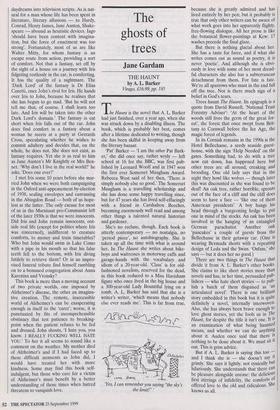The ghosts of trees
Jane Gardam
THE HAUNT by A. L. Barker Virago, £16.99, pp. 185 The Haunt is the novel that A. L. Barker had just finished, over a year ago, when she was struck down by a disabling illness. The book, which is probably her best, comes after a lifetime dedicated to writing, though she has been skilful in keeping away from the literary bazaar.
`Pat' Barker — 'I am the other Pat Bark- er,' she did once say, rather wryly — left school at 16 for the BBC, was first pub- lished by Leonard Woolf and in 1947 won the first ever Somerset Maugham Award. Rebecca West said of her then, 'There is simply nobody else so good.' The Somerset Maugham is a travelling scholarship and she has done some happy travelling since, but for 47 years she has lived self-effacingly with a friend in Carshalton Beeches, becoming enormously well read and among other things a talented natural historian and gardener.
She's no recluse, though. Each book is utterly contemporary — no nostalgia, no `period piece', no autobiography. She is taken up all the time with what is around her. In The Haunt she writes about bike- boys and waitresses in motorway caffs and garage-hands with the vocabulary and idiom of a 20-year-old. 'Class' is for old- fashioned novelists, reserved for the dead, in this book reduced to a Miss Havisham figure who once lived in the big house and a 300-year-old Lady Bountiful lying on a tomb. A. L. Barker has said that she is a writer's writer, 'which means that nobody else ever reads me'. This is far from true, `Yes, I can remember you saying "the sky's the limit!" ' because she is greatly admired and has lived entirely by her pen; but it probably is true that only other writers can be aware of what work goes into her apparently flighty, free-flowing dialogue. All her prose is like the botanical flower-paintings at Kew: 17 washes precede the final glaze.
But there is nothing glacial about her. She has a taste for farce, and if what she writes comes out as sound as poetry, it is never 'poetic'. And although she is obvi- ously in love with some of her most dread- ful characters she also has a subterranean detachment from them. For fate is fate. We're all sparrows who must in the end fall off the tree. Nor is there much sign of a belief in God's tears.
Trees haunt The Haunt. Its epigraph is a quote from David Russell, 'National Trust Forestry Adviser': 'At the heart of the woods still lives the germ of the great for- est', the forest that once swept from Brit- tany to Cornwall before the Ice Age, the magic forest of legends.
In its Cornish remains in the 1990s is the Hotel Bellechasse, a seedy seaside guest- house, with the sign 'Help Needed' on the gates. Something bad, to do with a tree now cut down, has happened here but other trees are all around, creaking and brooding. One old lady says that in the night they howl like wolves — though later this was discounted as she was found to be deaf! An oak tree, rather horrible, sprouts out of the face of a cliff and the cliff does seem to have a face — 'like one of them American presidents'. A boy hangs his head through a burgeoning hedge to put one in mind of the stocks. An oak has been involved in the hanging of an entangled German parachutist. Another oak `pancakes' a couple of guests from the Bellechasse in their getaway car. (One is wearing Bermuda shorts with a repeating design of Leda and the Swan. 'Oxfam,' she says — but it does her no good.) There are two things in The Haunt that divide it from A. L. Barker's other books. She claims to like short stories more than novels and has, in her time, persuaded pub- lishers — who hate short stories — to pub- lish a batch of them disguised as 'an articulated novel'. There is one brilliant story embedded in this book but it is quite definitely a novel, internally interwoven. Also, she has always been brave enough to love ghost stories, yet she fools us in The Haunt, for despite the title it isn't one. It is an examination of what being haunted means, and whether we can do anything about it. Auden once said that there is nothing to be done about it. We must sit it out. This is grim advice.
But if A. L. Barker is saying this too — and I think she is — she doesn't say it grimly. She says it lightly, not cynically but hilariously. She understands that there can be pleasure alongside unease: the delicious first stirrings of infidelity, the comforts of offered love to the old and ridiculous. She knows us all.


























































































 Previous page
Previous page